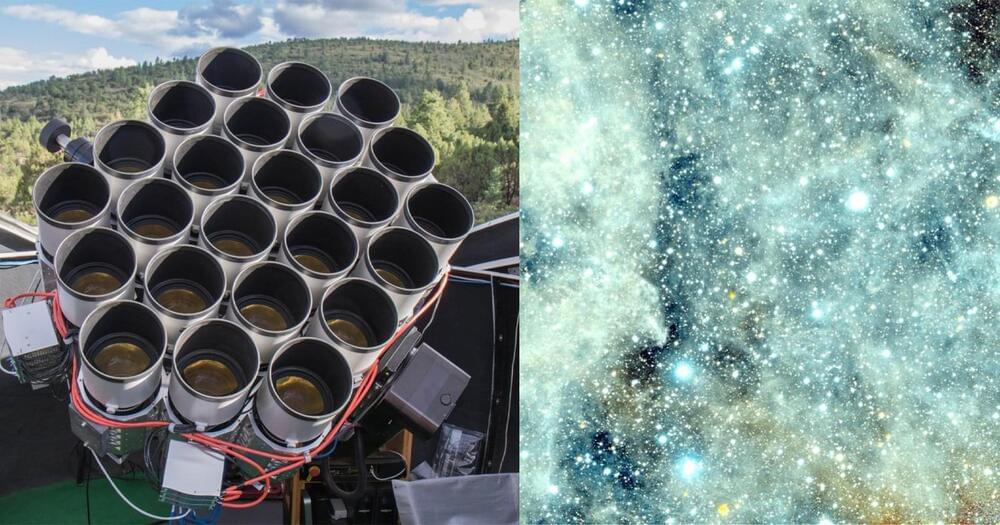By glowing when it’s nerby.
Bacteria that glow in the presence of a landmine may one day help save lives.



24 Canon lenses strapped together with the power of a refracting telescope 1.8 meters in diameter.
An international team of researchers has bundled groups of 24 Canon EF 400mm f/2.8 lenses together into what they call the Dragonfly Telephoto Array in order to capture photos of distant stars.
The Dragonfly Telephoto Array is a telescope that is equipped with multiple Canon 400mm f/2.8L IS II USM lenses. The telescope array was designed in 2013 by the team, also named Project Dragonfly, which is an international research team from Yale University and the University of Toronto. The Dragonfly Telephoto Array is capable of capturing images of galaxies that are so faint and large that they had escaped detection by even the largest conventional telescopes. Its mission is to study the low surface brightness universe to elucidate the nature of dark matter and to utilize the concept of distributed telescopes.
“The Dragonfly Telephoto Array is the pre-eminent survey telescope for finding faint, diffuse objects in the night sky,” the reseachers explain. “It has enabled us to discover ultra-diffuse galaxies and other low-surface brightness phenomena—rendering images that deepen our understanding of how galaxies are formed and providing key insights into the nature of dark matter.”
Re-sharing.
A value added tax, however, will take care of city services and infrastructure, which alone would cost 300,000 in Bitcoin or approximately $17 billion.
It’s a gigantic gamble, built on the premise that Bitcoin will continue to appreciate in the long term, allowing the country to repay its new debts. In other words, just another day in the mad world of crypto.
“Invest here and make all the money you want,” Bukele said during the event, which took place at a beach resort. “This is a fully ecological city that works and is energized by a volcano.”

😳! Circa 2018
Some animals live fast and die young. That means they need to grow up fast, too. This week, researchers crowned a new record holder for quick growth: Susan Milius at Science News reports that the turquoise killifish, Nothobranchius furzeri, found in Mozambique, can reach maturity in just 14 days, the fastest of any known vertebrate animal.
That rapid maturation is an adaptation to the killifish’s habitat, according to the study published this week in the journal Current Biology. The fish spend most of their lives as tiny embryos that have been deposited in sediment in small depressions across the savannah. When rain fills the ephemeral pools, the embryos mature rapidly reaching sexual maturity and depositing their own embryos before the pool once again dries up. Not only do they make babies quickly, they bulk up fast, too—typically growing from about 5 millimeters to 54 millimeters in their lifespan.
Researchers have been aware of the turquoise killifish’s super-fast maturation for a while. In fact, the fish is used as a model animal in aging studies because of this trait. In the lab, where the fish live a relatively leisurely lifestyle, the average rate of maturation is 18 days.

Circa 2019 o.o!
Black soldier fly meal only won approval as fish and poultry feed in 2018. Koutsos said EnviroFlight and companies such as Enterra in Canada and Protix in the European Union are working to win regulatory approval for using the meal in food for other animals, including swine and even cats and dogs.
The idea is to take pressure off traditional sources of protein meal, such as fish. About one-quarter of the harvest from marine fisheries is turned into food for farmed animals, including fish, hogs and poultry. More than 90 percent of those fisheries are either fully exploited or overfished, meaning that as the world’s population grows, there will be more demand for alternative protein sources.
“There’s no question that [soldier fly] meal is much more expensive right now than fishmeal,” Koutsos said. But fishmeal is becoming more expensive, and soldier fly technology is becoming cheaper. The goal, she said, is “to be at or below fishmeal [price] in five years.”

New work on linear-probing hash tables from MIT
MIT is an acronym for the Massachusetts Institute of Technology. It is a prestigious private research university in Cambridge, Massachusetts that was founded in 1861. It is organized into five Schools: architecture and planning; engineering; humanities, arts, and social sciences; management; and science. MIT’s impact includes many scientific breakthroughs and technological advances.

Sports giant Nike has taken a leap into the metaverse.
The Beaverton, Oregon, company announced Thursday that it is partnering with Roblox to create a virtual world called Nikeland on Roblox’s online gaming platform.
The virtual world includes Nike buildings, fields and arenas for players to compete in various mini-games, ranging from tag and dodgeball to “The Floor Is Lava.” It’s modeled after the company’s real-life headquarters. Nikeland will be free (for now).

Over the past several decades, researchers have moved from using electric currents to manipulating light waves in the near-infrared range for telecommunications applications such as high-speed 5G networks, biosensors on a chip, and driverless cars. This research area, known as integrated photonics, is fast evolving and investigators are now exploring the shorter—visible—wavelength range to develop a broad variety of emerging applications. These include chip-scale LIDAR (light detection and ranging), AR/VR/MR (augmented/virtual/mixed reality) goggles, holographic displays, quantum information processing chips, and implantable optogenetic probes in the brain.
The one device critical to all these applications in the visible range is an optical phase modulator, which controls the phase of a light wave, similar to how the phase of radio waves is modulated in wireless computer networks. With a phase modulator, researchers can build an on-chip optical switch that channels light into different waveguide ports. With a large network of these optical switches, researchers could create sophisticated integrated optical systems that could control light propagating on a tiny chip or light emission from the chip.
But phase modulators in the visible range are very hard to make: there are no materials that are transparent enough in the visible spectrum while also providing large tunability, either through thermo-optical or electro-optical effects. Currently, the two most suitable materials are silicon nitride and lithium niobate. While both are highly transparent in the visible range, neither one provides very much tunability. Visible-spectrum phase modulators based on these materials are thus not only large but also power-hungry: the length of individual waveguide-based modulators ranges from hundreds of microns to several mm and a single modulator consumes tens of mW for phase tuning. Researchers trying to achieve large-scale integration—embedding thousands of devices on a single microchip—have, up to now, been stymied by these bulky, energy-consuming devices.
